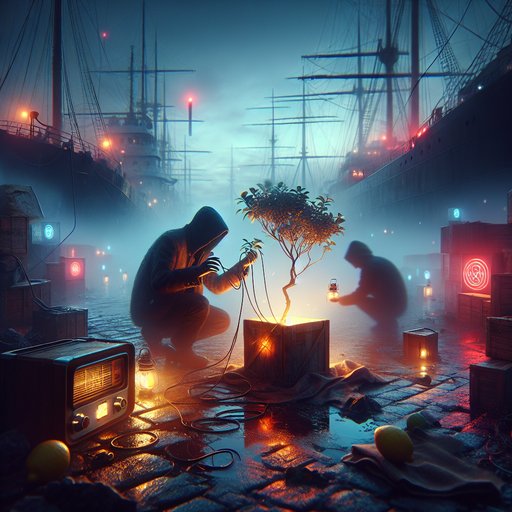
In a port city ribboned with smoke and broken glass, two strangers learn the shape of each other’s breath in the minutes between alarms. He keeps the voices alive through wires and static; she packs a history into boxes and keeps it warm with her hands. While the war chews at the edges of everything they know, they find a small tree and a ritual to contain the quiet, and promise to share a single lemon when the noise finally relents.
The sirens tangle with the gulls again, the high, mechanical wail colliding with the ragged cries that used to mean nothing more than fishing boats returning. Arun has learned to count out those ten seconds when the alarm dips, to find the seam of silence where his skin can unclench. Mina fits an earbud into his palm without looking, the wire a thin lifeline threading their stairwell. On the tiny radio he rebuilt from scavenged resistors and stubbornness, a voice lists names.
The cadence is patient and unhurried, like prayer. Dust trembles loose from the ceiling, and in the flicker of their emergency candle, a lemon leaf upstairs holds its own simplicity, green and glossy as if the city were not on fire three streets away. Morning eats what little sleep they found, and the blockade of the day begins. Mina shoulders her satchel—bandages, iodine, three pens, a notebook with the corners chewed—and navigates the queue at the water truck, her hand on the shoulder of the old woman in front of her whenever the crowd surges.
Arun thumbs his shop shutters into their reluctant grooves, each slat a note in a scale he has played too often. Someone has taped a child’s drawing to the rusted corrugate: a boat with a flag that used to mean summer. He pockets the taped battery the drawing is stuck with, then opens his door to the hum of broken things. Across the back alley, their roof waits with its incredulous tree, transplanted in spring from a neighbor who fled and pressed it into their care like an infant, as if they were capable of keeping anything alive in this heat and ash.
They met over the spine of a radio. Mina came in smelling of antiseptic, a smear of rust-colored dried blood on her sleeve. She peeled the cloth back as if it could explain itself. “It refuses to speak,” she had said, tapping the cracked plastic box.
Arun coaxed it open with the tenderness of someone unwrapping a gift meant for someone else, and asked her what she wanted to hear. “The names,” she said simply, and he nodded, threading copper wire through a problem that was mostly grief. As he soldered, her fingers hovered over his work, learning by watching. She wrote down the frequency he whispered as if it were a blessing.
When the radio sighed into a fraction of a voice, he glanced up, expecting triumph. Instead, he found her listening like she was apologizing to every name in the city she hadn’t saved. Peace, if it exists at all here, arrives on the roof. They climb when the heat flattens even the aggressions in the street, when even the soldiers seem bored in their armored skins.
Up among the water tanks and laundry that smells faintly of smoke, the lemon tree sways in the kindest wind left. Its roots have spread, greedy and hopeful, into a broken pot patched with perished glue and tape. Mina presses her thumb to the leaves to release the scent. It is as close to clean air as they can make.
Arun sets the little speaker on a brick and dials through static. Sometimes they get music—nothing they recognize, just a melody that finds the exact seam between spine and skin and goes to work there. Sometimes there are instructions: a clinic has moved; a street is gone; bring blood to the school. Mina teaches him the first steps of a dance she used to love, barefoot on the tar paper, counting under her breath.
He holds her hands and misses a beat deliberately just to hear her laugh. The city is learning the choreography of scarcity. The bakery where Mina bought sweet bread on Fridays now sells bricks of flour with stern instructions attached, as if dough resents being made during war. Arun’s father calls at dawn when the signal is sharp, to say he’s found a cache of old tube radios in a school basement, his voice stretched thin but still threaded with mischief.
They move them in a wheelbarrow through streets that used to be for strolling, Mina walking ahead with the easy authority of someone who knows where water turns to mud. At the checkpoint near the plaza, a young soldier in a too-large vest asks them for sugar. He doesn’t look old enough to remember the festival that used to pour color down these steps. Mina opens her bag and gives him two wrapped candies that have stuck together from August.
He eats them both without offering one to his partner and looks embarrassed about it. Arun watches Mina walk away with her chin up and feels something pull taut inside him, something he doesn’t name because naming things right now makes them visible to the wrong people. Whispers of the encirclement arrive faster than bread. The port is too dangerous, the old bridge is a rumor, the new one is a trap, nothing goes in that doesn’t come out in smoke.
At the archive, where Mina has been packing the city’s bent histories into crates—ledgers that still smell like the sea, a stone tablet discovered under a grocery, a string of tiny bells small enough to live in your throat—someone posts a list. Museum staff are to accompany the convoy in two days. The list is shorter than the staff. Mina’s name is there like a condensation ring left on a table.
When she tells Arun, his eyes flicker, then steady. “You’ll be safest with them,” he says, and the words come out neutral, like a diagnosis. She folds a red scarf and puts it into her bag. He slips three wrapped batteries into the inner pocket and says nothing.
At the roof they agree on the coordinates of their meeting place, should they get separated even within the evacuation. They speak as if reading instructions aloud to each other so they can’t claim later they didn’t know how. The night refuses to behave. A dull roar from the northern district swells until the air itself seems to boil.
The street behind the shop spits fire; glass falls like rain, and then it is rain, a sudden squall finding every place where roofs have forgotten to be roofs. They run for the lemon tree because they are ridiculous and human. Mina wraps the pot in a damp towel, Arun scoops soil back where it belongs with his hands, mud streaking both their forearms. Neighbors spill into the stairwell, carrying cats, mattresses, a framed picture of a woman laughing into the wind.
An old man sits on the landing and begins reciting a recipe for lamb with quince in a firm voice, as if insisting on the world’s prior arrangements can hold it in place. In the shop, the ceiling sags like a tired jaw, but the workbench still stands, soldering iron gleaming with unreason. Arun pulls the emergency transmitter from its hidey hole behind the shelf of antenna coils; Mina wipes the face of the little broadcast mixer as if it’s a patient arriving in shock. They plug in, bite down on fear, and their voices move through the building like clean water, reading instructions, then names, then the poetry people sneak onto the frequency when nobody is watching.
At dawn, an armored truck bruises the street outside. Boots and yelling knock around the block. A soldier bangs the butt of his rifle against their door until the hinges cry. When he steps into the shop, everything stiffens—the lemon leaf nearest the door burnishes under his shadow, Mina’s shoulders draw back, Arun forces his breath into the shape of harmless.
The soldier asks about transmitters in the tone of someone who has been told to ask and is bored with the answers. Arun lifts a battered portable set with scorched bakelite and says, “Repairs,” very clearly. The soldier’s gaze selects and discards objects, the way a wave chooses which stones to lift. He steps closer; his boot grazes the lemon’s pot and a leaf snaps softly.
Mina shows her palms. “We read the official bulletins so people will not get in the way,” she says, picking up a tone she’s learned from head nurses. That familiarity spares them. The truck coughs, the soldiers leave, and the air fills with the smell of fast gasoline and stunned relief.
On the roof afterward, they find the lemon has sweated a drop of oil at the broken place. Mina lifts it to her mouth and tastes the bitterness like a promise you don’t know how to keep yet. “If I go,” she says that evening, the sky a bruise just learning to lighten, “it’s to keep the city’s voices in one piece long enough to return them.” He nods, not trusting himself. “If I stay,” he says eventually, “it’s to give them something to return to.” They look at the fruit that has been swelling stubbornly under the leaves, the first and only of the season, dense as a fist.
It has grown against the odds and their occasional foolishness. “We don’t touch it until we drink it together,” Mina decides. He peels a strip of yellow skin—just a breath’s worth—and slips it into her pocket. “In case the road forgets you,” he says, and hears the way his voice lifts on the last word, betraying him.
He writes her a frequency in pencil on the inside of his wrist, then inks it onto hers with a pen that barely has any left to give. She ties her red scarf around his radio like a flag. The convoy leaves in a rattle of borrowed vehicles and borrowed authority. Mina stands on a bus that smells like other places, clutching a crate that holds the bells.
Beside her, a conservator whispers to herself in a language with more vowels than Mina is used to, pressing a cloth against a ceramic bowl to keep it from learning the wrong sound for breaking. The bus lurches. Through the window, the city tilts past: the plaza where once a dancer spun for seven minutes without touching the ground, the pharmacy that now sells candles next to antibiotics, the crooked alley where a woman still sells slippers and advice. On a roof, a red scarf lifts and flutters like a heartbeat.
Arun watches the convoy from his ladder, antenna balanced against his shoulder, the lemon tree tucked into a corner of shadow. As the signal grows and thins and swells again, he finds a seam in the jamming, cuts the frequency like glass, and hears her voice, tiny and luminous, reading the names of the streets, each syllable a string around his wrist. Time fattens at the border, then slips through their fingers the way flour does. Mina counts days by the number of times the cows in the field beyond the tents have rolled over in the mud and left new prints.
She plants the strip of lemon peel in a dented tin with wet cotton and speaks to it like a skittish animal. That night, a woman in the next tent tells a joke that requires a kettle; everyone laughs like they’ve been practiced for it. When Mina picks up the broadcast onto the convoy’s old receiver, she hears Arun’s voice reading evacuation logistics and then, like something that escaped, the description of a dream in which he is mending a net and every knot is a name he can tie back to a body. In the city, Arun builds an antenna from bed frame parts and clothes hangers; it rakes the sky and catches grief, hope, static, rain.
The lemon’s single fruit deepens color. He moves it out of the soot when he can. At midnight in both places, they sit with cups of hot water and drop in crumbs of lemon rind so tiny they might be memory, and listen to each other breathe between sentences. The rumor of a ceasefire arrives in the form of footsteps that do not run.
It pauses at doorways and refuses to say more. There are negotiations, someone says, and the word is a foreign bird that doesn’t know where to roost. The old bridge is a debate. The new one has lost its middle.
Boats gather and scatter in rehearsals—fishermen suddenly diplomatic, smugglers suddenly concerned with permits. Mina is told to wait until her name is called again. Arun is told nothing, which he prefers to being told to leave. They continue their work because momentum is easier than despair.
The lemon peel in Mina’s tin learns a curve. The fruit on Arun’s tree leans toward the window as if listening. They repeat their plan to each other, their coordinates, their ridiculous pact about the first lemon as if saying it aloud keeps the road between them swept. On a Thursday that pretends at spring, Mina steps off a bus at the edge of the port under a sky busy with weapons pretending to be birds.
The gulls have learned the difference; she has not. She tucks her scarf into her collar against a wind that smells like iron. At the end of the street that used to sell oranges, a crowd hovers near a low building that would be a café in a kinder story. The radio inside is playing a song about rain that no one thinks is about rain.
She stands on the threshold and listens to the hum of a soldering iron somewhere upstairs, a note she knows now like a voice. In the city, Arun climbs the last three steps to the roof, hands black with antenna grease, and stops because the air is thick with possibility or smoke; it’s hard to tell. He touches the lemon with two fingers and it yields, finally, warmth under skin. He doesn’t pluck it.
He waits. Below, the little radio crackles with a list of names not yet finished, syllables rolling in like water. In another neighborhood, a bus engine shudders and then quits, and the silence that follows makes everyone straighten, as if a conductor has lifted a hand they can’t see and the orchestra of their beating hearts must respond. They will share the fruit whether tonight or in a week or in a season that has another name somewhere.
Between sirens there is space enough for a dance step. Between static, a breath. In that hush, their promise lives, tart and bright on the tongue.









































